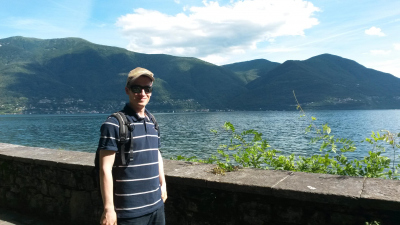Die Inhalte dieser Seite sind leider nicht auf Deutsch verfügbar.
Seitenpfad:
Christoph Häggi
Report of GLOMAR PhD student Christoph Häggi about his participation in the Plant Wax 2015 conference in Ascona, Switzerland from 16 - 20 June 2015
Thanks to funding by GLOMAR – Bremen International Graduate School for Marine Science, I was able to attend the Plant Wax 2015 conference on Monte Verità, Ascona, Switzerland from June 16th to June 20th 2015. The conference took place in a historic Bauhaus style hotel situated high above Lago Maggiore and was attended by about 75 scientists from all over the world, who gave a total of 38 talks and presented 34 posters.
As indicated by its name, the Plant Wax 2015 conference dealt exclusively with different aspects of plant waxes. The first part of the conference focused on the biosynthesis of plant waxes. A research field that is mainly covered by biologists and biochemists. The second part featured work on the incorporation of plant waxes into soils and sediments, as well as the interpretation of plant wax distributions in the geological record. A set of topics mainly covered by geoscientists. The combination of the biology and geoscience perspectives on plant waxes in one conference offered new surprising insights for both sides. Furthermore, it allowed for biologists and geoscientists to obtain information that is usually not featured in the literature and in conferences of their field. Finally, it lead to fruitful discussions on how to pursue the future of plant wax research.
My personal conference contribution was a 15 minutes oral talk on the transport and sedimentation of plant waxes in the Amazon River. The discussion of my research with other scientists working on similar questions provided me with a lot of fresh ideas. The discussions were especially rewarding, since the research of transport mechanisms of plant wax biomarkers is still in its infancy and there are now several working groups researching the fluvial transport of plant waxes in different regions of the world.
Overall, the Plant Wax 2015 conference was an extremely rewarding experience for me. I learned a lot of new things, especially from the biologists’ side of the plant wax community. I also got important updates on the current state of interpretation and application of plant wax proxies. Last but not least, I had many interesting discussions on the plant-wax biomarkers as well as paleoclimatology.
As indicated by its name, the Plant Wax 2015 conference dealt exclusively with different aspects of plant waxes. The first part of the conference focused on the biosynthesis of plant waxes. A research field that is mainly covered by biologists and biochemists. The second part featured work on the incorporation of plant waxes into soils and sediments, as well as the interpretation of plant wax distributions in the geological record. A set of topics mainly covered by geoscientists. The combination of the biology and geoscience perspectives on plant waxes in one conference offered new surprising insights for both sides. Furthermore, it allowed for biologists and geoscientists to obtain information that is usually not featured in the literature and in conferences of their field. Finally, it lead to fruitful discussions on how to pursue the future of plant wax research.
My personal conference contribution was a 15 minutes oral talk on the transport and sedimentation of plant waxes in the Amazon River. The discussion of my research with other scientists working on similar questions provided me with a lot of fresh ideas. The discussions were especially rewarding, since the research of transport mechanisms of plant wax biomarkers is still in its infancy and there are now several working groups researching the fluvial transport of plant waxes in different regions of the world.
Overall, the Plant Wax 2015 conference was an extremely rewarding experience for me. I learned a lot of new things, especially from the biologists’ side of the plant wax community. I also got important updates on the current state of interpretation and application of plant wax proxies. Last but not least, I had many interesting discussions on the plant-wax biomarkers as well as paleoclimatology.



